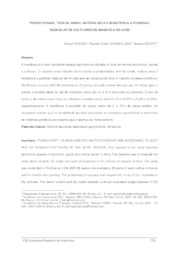Produtividade, teor de amido, matéria seca e resistência a podridão radicular de cultivares de mandioca do Acre.
Produtividade, teor de amido, matéria seca e resistência a podridão radicular de cultivares de mandioca do Acre.
Author(s): SIVIERO, A.; EVANGELISTA, R. C.; SCHOTT, B.
Summary: A mandioca é a mais importante espécie agronômica cultivada no Acre em termos econômico, sociais e culturais. O objetivo deste trabalho foi de avaliar a produtividade, teor de amido, matéria seca e resistência a podridão radicular de 44 cultivares de mandioca do Acre. O trabalho foi desenvolvido em Rio Branco na safra 2007/08 avaliando-se 20 plantas de cada cultivar dos seis aos 14 meses após o plantio. A produtividade de raiz de mandioca variou de 4,5 a 31,5 t/ha entre os cultivares. O teor de amido e de matéria seca entre os cultivares avaliadas variou entre 21,25 e 32,81% e 25,90 a 42,46%, respectivamente. A resistência à podridão de raízes variou de 0 a 15% de raízes podres. Os resultados indicam que há variabilidade genética para todos os caracteres agronômicos e ocorrência de materiais genéticos promissores para trabalhos de melhoramento. The cassava is the most important agronomic species in economic, social and cultural grown in Acre. The objective was to evaluate the yield, starch content, dry matter and root rot resistance of 44 cultivars of cassava of Acre. The study was conducted in Rio Branco in the 2007/08 season are evaluating 20 plants of each cultivar of the six and 14 months after planting. The productivity of cassava root ranged from 4.5 to 31.5 t / ha between the cultivars. The starch content and dry matter between cultivars evaluated ranged between 21,25 and 32,81% and 25,90 to 42,46%, respectively. Resistance to rotting of the roots ranged from 0 to 15% of rotten roots. The results indicate that there is genetic variability for all agronomic traits and the occurrence of genetic materials promising to work for cassava improvement.
Publication year: 2009
Types of publication: Paper in annals and proceedings
Unit: Embrapa Acre
Keywords: Acre, Acumulación de materia seca, Agronomic traits, Almidón de mandioca, Amazonia Occidental, Amazônia Ocidental, Amido, Características Agronômicas, Cassava, Cassava starch, Crop yield, Disease resistance, Doença de Planta, Dry matter accumulation, Mandioca, Manihot Esculenta, Matéria Seca, Rendimento, Rendimiento de los cultivos, Resistencia a la enfermedad, Rio Branco (AC), Variedade Resistente, Western Amazon, Yuca
Observation
Some of Embrapa's publications are published as ePub files. To read them, use or download one of the following free software options to your computer or mobile device. Android: Google Play Books; IOS: iBooks; Windows and Linux: Calibre.
Access other publications
Access the Agricultural Research Database (BDPA) to consult Embrapa's full library collection and records.
Visit Embrapa Bookstore to purchase books and other publications sold by Embrapa.

